Pat Bertram's Blog, page 213
December 13, 2013
Happy Friday the 12Ath!
I have no particular opinion or fear about thirteen or Friday or Friday the thirteenth, though I do find a lot of irony associated with the avoidance of thirteen. For example, buildings with more than 13 floors don’t call the 13th floor the 13th floor, but instead skip the number and go directly to the 14th floor or call it 12A. It’s still the 13th floor, right? So do people simply fear the number rather than the actual floor? And if they fear the number, do they refuse to buy baker’s dozens of donuts or cookies? (Though perhaps that is dating me — I don’t think I’ve come across a baker’s dozen of anything in a long time.) And if it’s the number thirteen they fear, why is only Friday the thirteeth a fearful day? I realize it’s the conjunction of fateful F riday and the ominous number that causes friggatriskaidekaphobia, but still, for those with the simpler case of triskaidekaphobia, wouldn’t any thirteenth day of the month be cause for concern?
riday and the ominous number that causes friggatriskaidekaphobia, but still, for those with the simpler case of triskaidekaphobia, wouldn’t any thirteenth day of the month be cause for concern?
(Interesting side note — in many Spanish speaking countries, Tuesday the thirteenth is the unlucky day, so for them, the movie Friday the Thirteenth was renamed Tuesday the Thirteenth.)
If Friday the thirteenth were really an unlucky day as more than 20 million Americans believe, to be on the safe side, shouldn’t the calendar makers follow the example of builders and call change all 13s that fall on a Friday to 14 or maybe even 12A? And speaking of calendars, our current calendar was not universally adopted in Europe until the eighteenth century. So is our current Friday the thirteenth the real Friday the thirteenth? Wouldn’t the day fall on other dates using other calendars?
Today is an especially interesting day considering that it’s exactly thirteen weeks since the last Friday the thirteenth in this year of twenty-thirteen, but I don’t know if that makes it more it a more dire day or simply a matter of curiosity.
Whether or not you believe that Friday the thirteenth is bad luck (and if you do, please forgive my levity), I hope you have a fearfully wonderful day.
***
Pat Bertram is the author of the suspense novels Light Bringer, More Deaths Than One, A Spark of Heavenly Fire, and Daughter Am I. Bertram is also the author of Grief: The Great Yearning, “an exquisite book, wrenching to read, and at the same time full of profound truths.” Connect with Pat on Google+. Like Pat on Facebook.
Tagged: 13th floor, Friday the 13th, friggatriskaidekaphobia, triskaidekaphobia, Tuesday the 13th


December 12, 2013
White Elephants, Life, and Other Gifts
I went to a Christmas party last night, the first one in . . . well, to tell the truth, I can’t remember ever going to a Christmas party, though I must have sometime or other.
We were each supposed to bring a gift — a white elephant, they said.
 The term “white elephant” is derived from the supposed Thai tradition of a king bestowing such an elephant on a subordinate he wished to ruin. The elephants were costly to maintain, didn’t do any work, and needed to be available to anyone who wished to worship the holy creature. A white elephant, then, is something unnecessary that is more trouble than it’s worth.
The term “white elephant” is derived from the supposed Thai tradition of a king bestowing such an elephant on a subordinate he wished to ruin. The elephants were costly to maintain, didn’t do any work, and needed to be available to anyone who wished to worship the holy creature. A white elephant, then, is something unnecessary that is more trouble than it’s worth.
How that definition of white elephant fits in with a white elephant gift exchange, I don’t know, since the way the term is used now, a white elephant is simply something you have but don’t want, something you make, or maybe even something you buy that isn’t expensive. Some people at the party brought wrapped up junk — a bag of old video tapes, a cracked mug, long-expired candy. Others gave an elaborate gift like an insulated backpack or something special like a handmade birdhouse.
We played a game with the gifting. We each got a number. The first person picked a gift, and opened it. The second person could “steal” that gift if they liked it or pick a new one. The last person, of course, could choose any of the opened gifts or take a chance on the final unopened one. (If someone “stole” the gift you had opened, you got to choose another one.)
It was an interesting psychological study. Some people very boldly went and snatched the opened gift they wanted. Others did it timidly or apologetically. The rest just took an unopened gift, choosing one carefully after examining all the offerings, or simply picking one at random.
Me? I acted true to form. When it came to my turn, I chose the nearest unopened gift. There was one opened one that I would have liked, but someone had already stolen the gift — an insulated back pack fitted out with accoutrements for a picnic — and I knew she wanted it. I could have stolen it from her, of course, but any pleasure I would have derived from the gift would have been dimmed by her disappointment. There were a few other gifts that might have been nice to have, but the truth is, when it comes to life and other gifts, I will always choose a mysterious unknown over a mediocre known, even though I know there is a good chance I will come out of it badly. (As I did — I got a bottle of men’s cologne, which I have absolutely no use for. I ended up giving it away.)
Even though I came away without a gift, I’m grateful I didn’t get stuck with a real white elephant. The zoning variances alone would have cost a fortune!
***
Pat Bertram is the author of the suspense novels Light Bringer, More Deaths Than One, A Spark of Heavenly Fire, and Daughter Am I. Bertram is also the author of Grief: The Great Yearning, “an exquisite book, wrenching to read, and at the same time full of profound truths.” Connect with Pat on Google+. Like Pat on Facebook.
Tagged: Christmas party, gift exchange, white elephant gift exchange, white elephant meaning


December 11, 2013
A Gift for a Grief-Stricken Friend
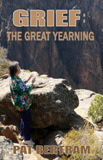 I haven’t really promoted my book Grief: the Great Yearning. It seemed crass and insensitive to capitalize on people’s grief, but the book has been a big help to many who have suffered a significant loss such as a husband or a parent. If you need a gift (or a stocking stuffer) for someone who is grieving, please consider giving them a copy of Grief: the Great Yearning. It might help to bring them comfort knowing that someone else has felt what they are feeling.
I haven’t really promoted my book Grief: the Great Yearning. It seemed crass and insensitive to capitalize on people’s grief, but the book has been a big help to many who have suffered a significant loss such as a husband or a parent. If you need a gift (or a stocking stuffer) for someone who is grieving, please consider giving them a copy of Grief: the Great Yearning. It might help to bring them comfort knowing that someone else has felt what they are feeling.
The print version of Grief: The Great Yearning is available from Second Wind Publishing, Amazon, Barnes and Noble. You can even give the ebook in any format as a gift. Just go to Smashwords and click on “Give as Gift”.
If there are people on your Christmas list who like to read, please check out my other books. I’m sure they’d like at least one of them!
***
 Bob Stark returns to Denver after 18 years in SE Asia to discover that the mother he buried before he left is dead again. At her new funeral, he sees . . . himself. Is his other self a hoaxer, or is something more sinister going on?
Bob Stark returns to Denver after 18 years in SE Asia to discover that the mother he buried before he left is dead again. At her new funeral, he sees . . . himself. Is his other self a hoaxer, or is something more sinister going on?
Click here to read the first chapter: More Deaths Than One
***
 In quarantined Colorado, where hundreds of thousands of people are dying from an unstoppable, bio-engineered disease, investigative reporter Greg Pullman risks everything to discover the truth: Who unleashed the deadly organism? And why?
In quarantined Colorado, where hundreds of thousands of people are dying from an unstoppable, bio-engineered disease, investigative reporter Greg Pullman risks everything to discover the truth: Who unleashed the deadly organism? And why?
Click here to read the first chapter of: A Spark of Heavenly Fire
***
 When twenty-five-year-old Mary Stuart learns she inherited a farm from her recently murdered grandparents — grandparents her father claimed had died before she was born — she becomes obsessed with finding out who they were and why someone wanted them dead.
When twenty-five-year-old Mary Stuart learns she inherited a farm from her recently murdered grandparents — grandparents her father claimed had died before she was born — she becomes obsessed with finding out who they were and why someone wanted them dead.
Click here to read the first chapter of: Daughter Am I
***
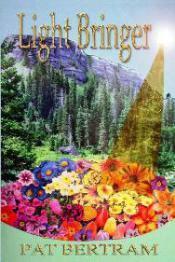 Thirty-seven years after being abandoned on the doorstep of a remote cabin in Colorado, Becka Johnson returns to try to discover her identity, but she only finds more questions. Who has been looking for her all those years? And why are those same people interested in fellow newcomer Philip Hansen? And what do they have to do with a secret underground laboratory?
Thirty-seven years after being abandoned on the doorstep of a remote cabin in Colorado, Becka Johnson returns to try to discover her identity, but she only finds more questions. Who has been looking for her all those years? And why are those same people interested in fellow newcomer Philip Hansen? And what do they have to do with a secret underground laboratory?
Click here to read the first chapter of: Light Bringer
***
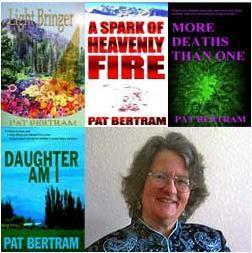 Pat Bertram is the author of Light Bringer, More Deaths Than One, A Spark of Heavenly Fire, and Daughter Am I.All Bertram’s books are available both in print and in ebook format. You can get them online at Second Wind Publishing, Amazon, B&N and Smashwords. At Smashwords, the books are available in all ebook formats including palm reading devices, and you can download the first 20-30% free!
Pat Bertram is the author of Light Bringer, More Deaths Than One, A Spark of Heavenly Fire, and Daughter Am I.All Bertram’s books are available both in print and in ebook format. You can get them online at Second Wind Publishing, Amazon, B&N and Smashwords. At Smashwords, the books are available in all ebook formats including palm reading devices, and you can download the first 20-30% free!
Tagged: A Spark of Heavenly Fire, Daughter Am I, gift for someone who lost a husband, Grief: The Great Yearning, Light Bringer, More Deaths Than One, Pat Bertram


December 10, 2013
And oh, I’m alive, I’m alive, I’m alive
I went to a dance recital at the college the other day, and wow, those kids could fly! So young, so fit, so lithe. None of the dancers would have even a glimmer of clumsiness while doing the sitting test with incredible ease. Of course, the test is geared toward older folk, but even when I was young I didn’t have the strength and agility those kids had.
 The first dance is the one that had the most impact on me, probably because it was the first. I’d never seen some of the stunts they pulled. Although dozens of dancers were on stage at all times, not everyone performed the same steps. It seemed as if two or three dances were going on at the same time in a dizzying blur of interconnected motion. But one thing they all did at one point— lie down as if they were going to do pushups, and then, on hands and toes, hop to the side again and again.
The first dance is the one that had the most impact on me, probably because it was the first. I’d never seen some of the stunts they pulled. Although dozens of dancers were on stage at all times, not everyone performed the same steps. It seemed as if two or three dances were going on at the same time in a dizzying blur of interconnected motion. But one thing they all did at one point— lie down as if they were going to do pushups, and then, on hands and toes, hop to the side again and again.
It was a very powerful dance, and no wonder — the song they danced to was “thatPower”. Not a song I was familiar with. Not one I would ever have willingly listened to. Most of it was . . . well, to be kind, let’s just say it’s not my kind of music. The chorus, however, is haunting me, and I’m allowing it to play in my mind.
In the midst of the non-song, the chorus (sung by Justin Bieber) was surprisingly tuneful and uplifting:
And oh, I’m alive, I’m alive, I’m alive
And oh, I can fly, I can fly, I can fly
And oh, I’m alive, I’m alive, I’m alive
And I’m loving every second, minute, hour, bigger, better, stronger power.
Usually I can’t stand when a song plays itself repeatedly in my head and do what I can to remove it, but I like this message, this affirmation. I am alive. I can fly if only in my thoughts and dreams. And while I might not be loving every minute, I am living every second, minute, hour. And I am getting better and stronger, more powerful. Sometimes I can even feel the power, though I don’t know where that power comes from. The earth maybe. Grief maybe. Myself maybe. I do know I am more confident than I’ve ever been. More accepting of life and its ups and downs. Enjoying being alive — coming alive — for the first time in many years.
***
Pat Bertram is the author of the suspense novels Light Bringer, More Deaths Than One, A Spark of Heavenly Fire, and Daughter Am I. Bertram is also the author of Grief: The Great Yearning, “an exquisite book, wrenching to read, and at the same time full of profound truths.” Connect with Pat on Google+. Like Pat on Facebook.
Tagged: And oh I'm alive, dance recital, haunted by a song, Justin Bieber, song in my head, thatPower


December 9, 2013
Wise Women of Cyberspace
I’ve met many wise and wonderful women online while struggling to find my way through grief, women who gave me the courage to do what was necessary — accept the pain, feel each emotion as it arose, and somehow find a way to live with it. One such woman and I would talk on Facebook about grief now and again — she was three years ahead  of me in the process, and had found a new direction in her life, which gave me hope that someday, I too, would manage to find peace and even renewed life.
of me in the process, and had found a new direction in her life, which gave me hope that someday, I too, would manage to find peace and even renewed life.
She posted one of her comments from our conversation on her blog today, Patience, Wallowing and Defragmentation, and explained how the lessons she learned while dealing with grief have helped her in dealing with health issues.
The conversation she referred to in her blog took place two years ago, but that wasn’t the end of our discussions. Just a couple of months ago I wrote: “It is sinking in that I couldn’t make him well when he was alive, and I can’t keep him with me now that he’s dead. As much as I hate his being dead, in a way, it has nothing to do with me.”
She responded:”That’s the toughest part — realizing that their death has nothing to do with us and that we are all, while connected through a web of energy, uniquely created beings following our own individual path. Regardless of how connected we are to some people in some ways, their path is theirs and ours is ours.”
It’s this knowledge that his death belongs to him and my life belongs to me that has helped me move beyond my mourning. My grief for him cannot make him alive once more, cannot change one facet of his life or his death. Of course, I had little choice in my grief — it came from somewhere so deep inside that I’d never know such a place existed. Grief still wells up on its own now and again, but I don’t try to hold on to it, don’t try to hold on to the past, don’t try to hold on to him. And perhaps, that takes the most courage of all — letting him go.
Lucky for me, I had such a wise woman giving me counsel.
***
Pat Bertram is the author of the suspense novels Light Bringer, More Deaths Than One, A Spark of Heavenly Fire, and Daughter Am I. Bertram is also the author of Grief: The Great Yearning, “an exquisite book, wrenching to read, and at the same time full of profound truths.” Connect with Pat on Google+. Like Pat on Facebook.
Tagged: grief support, lessons of grief, letting go of the past, living with grief, mourning


December 8, 2013
Look Out Life, Here I Come!
I gave up dating when I was nineteen. It was too much like trying to slog my way through a pool of molasses without any of the sweetness to make the experience palatable. I remember once the boy took me to a nice restaurant, and then sat there like a lump. Perhaps he figured that since he was paying for the meal I had to entertain him, but if I said something, his eyes would glaze over or he’d shift his gaze away to look at anything but me. If I asked a question about him, he’d respond in as few words as possible, then lapse into shifty silence again. It was like dropping a pebble into the sand. No ripples of conversation. Just a few dull words plunked on the table between us. If it was only him this happened with, I might not have been so quick to exit the dating scene, but it was typical of  all my dates. Which was okay. I didn’t want to fall in love, didn’t want to spend my life with anyone, didn’t want to be tied down.
all my dates. Which was okay. I didn’t want to fall in love, didn’t want to spend my life with anyone, didn’t want to be tied down.
Because of this dating experience, my meeting Jeff — the man I would spend thirty-four years of my life with — came as a total shock. I stopped into his health food store one day and happened to drop a few verbal pebbles. He took those pebbles, skimmed them across the space between us, creating ripples galore. Then he tossed more pebbles into the conversational waters while I was skimming those pebbles back to him. All those ripples caused a tide pool that kept me connected to him until he died. (I was an hour late for work that day we met, and when I told my boss and co-workers why, they laughed, thinking I was making a joke since they knew my history with the opposite sex.)
For the past few months, a friend has been trying to talk me into joining an online dating site, and I finally succumbed. I don’t want another lifelong relationship. I don’t even want to fall in love. But it would be nice to have someone to do things with. Go out to lunch once in a while. Maybe go bowling or to the beach. Something.
My friend has been finding matches for me, so I’ve been writing to her choices as well as the site’s matches. Only three people responded, and oh, man. Talk about regressing back to adolescence. Conversational pebbles plunking into the sand. No ripples. Just dead end thuds.
Don’t people know how to converse, in person or online? It’s simple. I say/write something, expressing an interest in you, then you say/write something, expressing an interest in me.
I wrote charming notes to dozens of prospects, referring to things they posted on their profiles and ending with a pertinent question to get the conversational ripples going. The three who responded answered the question in monosyllables, and that was it. When I responded to their response, I got even fewer syllables. No show of interest in me or in anything, actually.
One of the three claimed to be funny, to love jokes and all kinds of humor. I thought we might have a few laughs, but he found my attempt at humor insulting, and I found him pedantic. One guy claimed to love words, but when I offered a bit of word play and the link to a cool word site, he merely thanked me. Plunk.
I thought this would be hard because of my not being ready, but it’s hard in a way I never even imagined. Like reliving adolescent hell. Still, I didn’t really expect anything from the site. Signing up was mostly a symbolic way of throwing myself into the future. A way of saying, “Look out life, here I come!”
***
Pat Bertram is the author of the suspense novels Light Bringer, More Deaths Than One, A Spark of Heavenly Fire, and Daughter Am I. Bertram is also the author of Grief: The Great Yearning, “an exquisite book, wrenching to read, and at the same time full of profound truths.” Connect with Pat on Google+. Like Pat on Facebook.
Tagged: dating, dating after the death of a spouse, how to converse, online dating, ripples


December 7, 2013
How Many Years Do You Have Left?
Sometimes research gets so bizarre and obtuse that the results seem meaningless. For example, Brazilian physician Claudio Gil Araujo came up with a test to predict how many years we have left.
The test was for 51 to 80 year olds, but so far I haven’t found anyone that age who could perform the test perfectly, not even the dancers I know. For the test, you’re supposed to stand in the middle of the room, cross your legs, then gracefully lower yourself into a cross-legged sitting position without using your hands, elbows, or knees. You get 5 points if you can get down into a sitting position. If you can do it but are clumsy, you lose a point. Every time a hand or knee touched the ground, you lose another point. Next, you’re supposed to stand up, legs still cr ossed, without any part of you touching the ground. This gains you another five points, but again, if you are clumsy, you lose a point. Every time a body part touches the ground, you lose a point.
ossed, without any part of you touching the ground. This gains you another five points, but again, if you are clumsy, you lose a point. Every time a body part touches the ground, you lose a point.
The maximum is ten points. Araujo’s research indicated that if you score less than 8 points, you are twice as likely to die within the next five years as those who scored more than 8, and if you score less than 3 points, you are five times more likely to die.
According to these statistics, I should have been dead long ago. I have never in my life, except perhaps as a small child, been able to do simply cross my legs and sink gracefully into a cross-legged sitting position.
Beyond that, the parameters of the test were ridiculous — there is a vast difference in mortality and fitness, health and agility from the ages of 51 to 80. The test would have had more validity if it centered on a single age or at least narrowed the age grouping. 51 to 60, 61 to 70, 71 to 80. It should also have been divided by men and women.
A 51-year-old male has a .59% chance of dying within a year, and a 51-year-old woman has a .35% chance of dying. An 80-year-old man has a 6.16% chance of dying within a year, and an 80-year-old woman has a 4.39 chance of dying. Considering that as a rule men have shorter life expectancies, and 68% of the participants were men, the test results would have been skewed even further. Supposedly, they adjusted for such factors, but there was no indication of what those adjustments comprised. Besides, genetics is a huge factor. If one’s parents lived to a very old age, you have a better chance of doing so yourself regardless of your ability to sit crosslegged. (The test does not apply to those less than 50 since the results are vastly different.)
The way I figure, f you want to know how long you have left to live — just live life to the fullest, and one day you will arrive at the end. Then you will know.
***
Pat Bertram is the author of the suspense novels Light Bringer, More Deaths Than One, A Spark of Heavenly Fire, and Daughter Am I. Bertram is also the author of Grief: The Great Yearning, “an exquisite book, wrenching to read, and at the same time full of profound truths.” Connect with Pat on Google+. Like Pat on Facebook.
Tagged: Brazilian physician Claudio Gil Araujo, how long you have left to live, how many years do you have left, life expectancy, sitting test


December 6, 2013
Grief: Yes, There is Hope
A woman whose husband died six months ago contacted me to say she’s reading Grief: The Great Yearning and is finding comfort from knowing that what she is feeling, others have felt. She mentioned that some things I wrote were identical to things she wrote in her journal, which goes to show that grief is individual, and yet much is the same when it comes to losing a husband or a soul mate. The pain goes down so deep, it hits places in our psyches we didn’t even know existed.
The woman asked how I was doing, then posed the question that haunted me for years: “Is there hope for me?”
It’s hard to believe, when you are lost in the cyclone called grief, that there will ever come a time of peace. Since I had no such belief, I held tight to the belief of others that the pain will ebb, that I will find renewal. The y kept telling me to be patient, that it takes three to five years, but around four years most people find a renewed interest in life. And so it is with me. I feel alive again. I still have an underlying sadness. I miss him, of course, and always will — I even cry for him occasionally, though the tears pass easily without lingering pain.
y kept telling me to be patient, that it takes three to five years, but around four years most people find a renewed interest in life. And so it is with me. I feel alive again. I still have an underlying sadness. I miss him, of course, and always will — I even cry for him occasionally, though the tears pass easily without lingering pain.
I am finding that certain songs, movies, days, memories, bring about an upsurge of grief, and apparently, from what others have experienced, this will be true for the rest of my life, but at least I feel as if I am alive. I felt disconnected from life for a long time, as if I too had died. And partly, that is true — the person I was when I was with him did die. But now I need to be the person I am when I am with me. I can no longer take him into the equation of my life. My being alive does not make his being dead any less significant, though oddly, his being dead does make my being alive more significant. I once loved deeply. I once was so connected to another human being that his death sent me reeling for years.
But now, I am me. Just me. Not a bad thing to be.
This change in me is obvious. I met someone on my walk today, someone I’d talked to sporadically over the past three and a half years. He stopped me, asked me how I became such a star. (Radiant, he meant.) He barely recognized me, even though I was wearing the same sort of comfortable and inelegant clothes I always wear when walking. In fact, he said at first he thought I was young enough to be my daughter. He hunched his shoulders forward to show me how I used to walk — like an old woman.
So yes, there is hope. If you’re still grieving or feeling unalive after suffering a significant loss, take heart. If I can find my way back to life, so can you. Just grieve, find comfort where you can, try new things, and be patient with yourself. The pain does ebb, and chances are, around the fourth or fifth-year anniversary, you will find a renewed interest in life. Until then, wishing you peace.
***
Pat Bertram is the author of the suspense novels Light Bringer, More Deaths Than One, A Spark of Heavenly Fire, and Daughter Am I. Bertram is also the author of Grief: The Great Yearning, “an exquisite book, wrenching to read, and at the same time full of profound truths.” Connect with Pat on Google+. Like Pat on Facebook.
Tagged: fourth year of grief, grief gets better, hope and grief, renewal after grief, there is hope for grief


December 5, 2013
“Ordinary People Becoming Extraordinary”
Sometimes we have to laugh at ourselves and our conceits. Yesterday I wrote a blog post Whose Book Is It? about readers who saw something different in my books than I intended. I wrote:
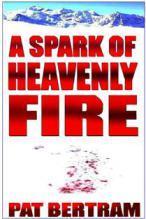 A reader once pointed out that A Spark of Heavenly Fire was about love in all its guises. He was right, that is a major theme, though that hadn’t been my intention. I wanted to write a big book, an important book with ordinary people becoming extraordinary in perilous times. Since I didn’t want to do a war story, I did the next best thing — created an epidemic so deadly that the entire state of Colorado had to be quarantined to prevent the spread of the disease. To “personalize” the catastrophe, I told the story from several points of view, not just character POV, but the various ways the characters viewed the epidemic. And what shone through, by the time all the stories were told, was the theme of love in all its guises.
A reader once pointed out that A Spark of Heavenly Fire was about love in all its guises. He was right, that is a major theme, though that hadn’t been my intention. I wanted to write a big book, an important book with ordinary people becoming extraordinary in perilous times. Since I didn’t want to do a war story, I did the next best thing — created an epidemic so deadly that the entire state of Colorado had to be quarantined to prevent the spread of the disease. To “personalize” the catastrophe, I told the story from several points of view, not just character POV, but the various ways the characters viewed the epidemic. And what shone through, by the time all the stories were told, was the theme of love in all its guises.
It wasn’t until this morning that I remembered that I hadn’t intended to write an important book with ordinary people becoming extraordinary in perilous times. Well, the important book part is right — I wanted to write a classic story that most people would be able to identify with. But I never used the phrase about ordinary people becoming ordinary until I received a rejection letter from an agent, in which the agent thanked me for sending them my excerpt since they “were always looking for such stories about ordinary people becoming extraordinary, but . . .”
Oddly, I don’t remember what followed the “but.” There was always a “but.” “We liked the concept of your story but we didn’t fall in love with your characters as we had hoped.” “Your book is excellent, but we only publish literary books and yours is more commercial.” “We loved your book, but we don’t know how to sell it. It has too many science fiction elements to be mainstream fiction and not enough to be science fiction.”
But I digress. The point is, that is where I got the idea of A Spark of Heavenly Fire being a story of ordinary people becoming extraordinary. I figured if I got a personalized rejection letter rather than a badly Xeroxed form letter or even just a “no thanks” scribbled on my query, that maybe I was on to something. So I started using the phrase “ordinary people becoming extraordinary” to describe the book in subsequent query letters. I did it so often that it stuck even after I learned the truth — the rejection letter that had so impressed me had been a form letter after all. (I thought that since they had expressed an interest in my writing, I’d query them about another book and got the exact response as I did the first time.)
The truth of why I wrote A Spark of Heavenly Fire is that I wanted to write about society turned upside down. I wanted to create conditions where the successful folk didn’t have the skills to be successful in the new world, but the unhappy, the failures, and the outcasts were able to find happiness, success, and fulfillment. I mostly achieved that, but one character — a beautiful young woman — turned out to have good coping skills, which gave the book more of a dimension than if she’d ended up in the gutter.
***
Pat Bertram is the author of the suspense novels Light Bringer, More Deaths Than One, A Spark of Heavenly Fire, and Daughter Am I. Bertram is also the author of Grief: The Great Yearning, “an exquisite book, wrenching to read, and at the same time full of profound truths.” All Bertram’s books are published by Second Wind Publishing. Connect with Pat on Google+
Tagged: A Spark of Heavenly Fire, ordinary people becoming extraordinary, query letters, rejection letters


December 4, 2013
Whose Book Is It?
We writers do the best we can to tell an engaging story, hoping readers will like what we have written, but often readers see something in the story that we didn’t purposely put there.
Sometimes this “extra” is good. A reader once pointed out that A Spark of Heavenly Fire was about love in all its guises. He was right, that is a major theme, though that hadn’t been my intention. I wanted to write a big book, an important book with ordinary people becoming extraordinary in perilous times. Since I didn’t want to do a war story, I did the next best thing — created an epidemic so deadly that the entire state of Colorado had to be quarantined to prevent the spread of the disease. To “personalize” the catastrophe, I told the story from several points of view, not just character POV, but the various ways the characters viewed the epidemic. And what shone through, by the time all the stories were told, was the theme of love in all its guises.
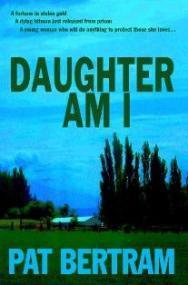 But sometimes the “extra” that readers find is not so good. Daughter Am I is the story of old time gangsters. A young woman inherits a farm from murdered grandparents she didn’t know she had — her father had claimed they died before she was born. When she confronts her father with his lie, he merely responds, “They were dead to me.” She becomes obsessed by the mysteries of why her grandparents had been murdered and what they had done that was so terrible their only son cut them out of his life.
But sometimes the “extra” that readers find is not so good. Daughter Am I is the story of old time gangsters. A young woman inherits a farm from murdered grandparents she didn’t know she had — her father had claimed they died before she was born. When she confronts her father with his lie, he merely responds, “They were dead to me.” She becomes obsessed by the mysteries of why her grandparents had been murdered and what they had done that was so terrible their only son cut them out of his life.
She tracks down her grandfather’s friends, most of whom had lived nefarious lives, and she gradually learns who her grandfather was. At the end of the book, her actions mirror what she has learned about her grandfather, and so she learns the truth of him.
This is the book I had written — a young woman searches for her grandfather, and finds him in herself, in her outlook on life, in her dealings with others.
One friend who read the book was reticent to tell me what she thought. She admitted she loved the characters and the writing, but then she finally said, in a hesitant voice, “But the ending isn’t exactly moral, is it?”
In thinking about it, I had to admit it wasn’t strictly moral, but the ending was inevitable since it fit the search-for-identity story I’d written. I didn’t really think anything more about it until I saw a review where someone liked the book and the characters, but didn’t like cynicism of the book — that anything is justifiable as long as you treat your friends right.
These two comments made me wonder about the truth of the story. Was it really cynical? Really immoral? I wasn’t trying to make such points. I merely wanted to tell a “hero’s journey” story about gangsters. And gangsters, by definition are immoral. If they weren’t, if they were law-abiding citizens, they wouldn’t be gangsters, they’d be corporate executives. (Well, maybe that’s a bad example, considering how many stories of larcenous corporative executives end up in the newspaper.)
In the end, it doesn’t really matter what story they read, at least not from my perspective. The truth of any story is in the minds of readers. We writers can only write the story we know how to write, then send them out into the world to make whatever they can of themselves.
***
Pat Bertram is the author of the suspense novels Light Bringer, More Deaths Than One, A Spark of Heavenly Fire, and Daughter Am I. Bertram is also the author of Grief: The Great Yearning, “an exquisite book, wrenching to read, and at the same time full of profound truths.” All Bertram’s books are published by Second Wind Publishing. Connect with Pat on Google+
Tagged: A Spark of Heavenly Fire, Daughter Am I, reader's opinions, the truth of a story





